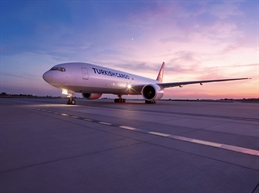
Turkish Cargo said despite the challenging environment caused by continued disruptions brought by the coronavirus pandemic, it was able to grow its network and expand its market share while investing in digitalization as it positions itself for future growth.
Hüseyin Ceyhan, vice president, Asia Pacific, at Turkish Cargo said the air cargo market saw an “extraordinary period” of decline at the start of the year with the onset of Covid-19, but that Turkish Cargo was able to move quickly to avert such an impact and help maintain the global supply chain.
Increased routes, market share
“By integrating our airliners to cargo operations rapidly, Turkish Cargo increased its market share to 5%, despite the challenges and the market conditions,” Ceyhan told Asia Cargo News.
He noted that Turkish Cargo transported health care and aid materials, taking advantage of Turkey’s pivotal position to connect Asia, Europe and the Middle East.
Being the first air cargo brand to hold all three IATA certifications – CEIV Pharma, CEIV Fresh and CEIV Live Animal – Turkish Cargo’s increased market share from 3.9% last year was boosted by its “special cargo operations,” which WorldACD said grew by 67% year on year in the first half of 2020. Turkish Cargo holds 5.4% of the market share for special cargo transportation.
“The global air cargo sector was heavily affected in the first months of the pandemic, but Turkish Cargo continues its business processes and is opening new cargo freighter destinations,” Ceyhan added, noting that the cargo arm of Turkish Airlines increased the number of destinations at it organizes direct cargo operations to 95.
In September, it added London, Bangkok, Singapore and Beirut to its network, with Bucharest and Lahore to be added within the winter schedule.
Efficient use of aircraft
During the Covid-19 period, airlines with access to freighters have tended to perform better, as pure passenger airlines have seen much of their capacity disappear from the market. Like other airlines, Turkish Cargo has used both freighters and widebody passenger planes to maximize cargo capacity.
“The industry has experienced a general trend of making use of smaller, higher-yielding aircraft. We have been operating the fleet in a more active and beneficial manner. While maintaining operations to 95 destinations, each of which is a direct cargo destination, by making use of our 25 freighters, our brand continues to benefit from the cargo transport capacity of the [passenger planes],” Ceyhan told Asia Cargo News.
“We operated more than 1,100 flights by making use of [passenger planes] and freighters in August alone, while having performed cargo operations to more than 50 destinations, in particular London, Moscow, Oslo, Shanghai, Bangkok, Doha, New York and Casablanca by making use of more than 30 of our widebody passenger airliners,” he added.
Between February 1 and August 31, 2020, Turkish carried 30,000 tons of medicine and nearly 10,000 tons of medical equipment.
Investment in digitalization
Meanwhile, Turkish Cargo has pursued digitalization of its operations as part of its effort to become one of the Top 5 air cargo brands in the world.
Ceyhan said Turkish Cargo has been adapting its activities to the “new market dynamics” and continues to enhance its services with investments made in terms of flight network, fleet and innovative technologies.
Its brand-new SmartIST facility, which is due to be fully operational by 2021, is being built at Istanbul Airport and will be equipped with state-of-the-art technology, he added.
“Within this scope, Turkish Cargo strives to achieve improvements in operational speed and quality following use and integration of several smart technologies, such as augmented reality, automatic storage systems, virtual workforce and unmanned ground vehicles, into the processes,” Ceyhan said.
Recently, Turkish also announced the integration of robotic process automations to minimize error rates on information entry and for spot rate approval, which it said would reduce error rates and costs while improving the efficiency of operations.
Last year, Turkish Cargo reported the highest growth rate among the Top 10 freight carriers, as IATA data showed that its traffic increased by 19.3% year-on-year to more than 7 billion freight tonne-kilometres.
By Charlee C. Delavin
Asia Cargo News | Hong Kong




